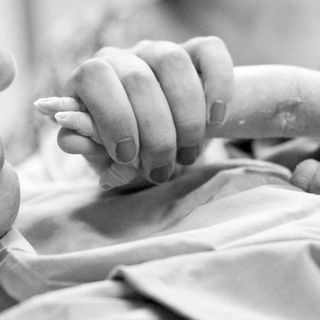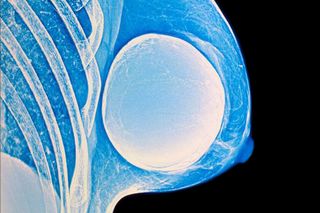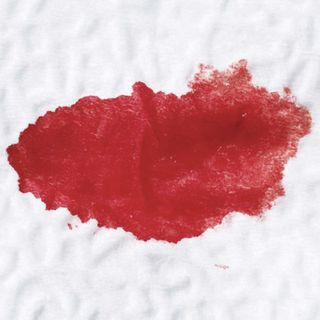
Tens of Thousands of Women Are Complaining of Breast Implant Illness Globally
“The tiredness was like I had run a marathon and dug a million trenches, but I hadn’t done anything.”

Tens of thousands of women worldwide are claiming to suffer from ‘Breast Implant Illness’ (BII), with complaints ranging from brain fog, hair loss, fatigue, Irritable Bowel Syndrome, headaches, photosensitivity, chest pain, sleep disturbance and autoimmune diseases such as lupus and fibromyalgia, a long-term condition that manifests as chronic pain all over the body. Despite this, BII is not yet an official medical diagnosis, though medical professionals and administrators are now calling for more research into the negative effects of breast implants — especially with recent reports linking them to an increased risk of developing lymphoma, a kind of cancer.
For fitness instructor Naomi Macarthur who got implants in 2014, BII manifested with the “most horrific symptoms” including blinding pain in her stomach. “And the tiredness was like I had run a marathon and dug a million trenches but I hadn’t done anything. … Writing with a pen was too tiring,” she said, speaking to the BBC.
When Macarthur went to doctors, they insisted her symptoms had nothing to do with her implants. Plagued by the reality of her declining health, Macarthur sought out support on an online forum for BII. She realized she wasn’t alone in what she was going through and got her implants removed — also known as explanting — in 2018. Within days, her symptoms started disappearing.
“Surgeons should be warning patients about Breast Implant Illness. Patients need the most up-to-date information possible, with the caveat that [it] is poorly understood,” said Dr. Nora Nugent, a surgeon with the British Association of Aesthetic Plastic Surgeons, while speaking to BBC.
The U.K.’s National Secretary for the International Society of Plastic Surgery, Naveen Cavale, told the BBC, that while BII made “no scientific sense” to her, talking about it with patients is essential. “As far as some of my patients are concerned, breast implant illness is a very real thing for them, and I have no reason to doubt them,” she said. The U.K.’s Medicines and Healthcare products Regulatory Agency alone received 1,586 Adverse Incident Reports for breast implants between 2014 and May 2019, reports The Week.
Related on The Swaddle:
More Than Half of Women Surveyed Say Their Gynacs Haven’t Mentioned Breast Exams
Discussion around BII is also gaining ground in the U.S., with the Food and Drug Administration holding a two-day conference in March 2019, prompted by reports of BII from tens of thousands of women. During the conference, its general and plastic surgery devices panel listened to patients, advocates, researchers and stakeholders from the industry itself. “While the FDA doesn’t have definitive evidence demonstrating breast implants cause these symptoms,” the FDA noted in a post-conference statement, “the current evidence supports that some women experience systemic symptoms that may resolve when their breast implants are removed, referred to by some patients and health care professionals as breast implant illness. We believe women considering a breast implant should be aware of these risks.”
The FDA has recorded more than 90 symptoms relating to breast implant illness in its Medical Device Reporting database, including acid reflux, ear ringing, easy bruising and rheumatoid arthritis. During the conference, the agency heard testimonies from women who say they had developed breast implant-associated anaplastic large cell lymphoma (BIA-ALCL) — a cancer of the immune system — from their implants, and experienced symptoms like chronic fatigue, intestinal issues, and unexplained rashes and itching.
On July 24, 2019, the FDA ordered a worldwide recall of textured breast implants made by pharmaceutical company Allergan, after new research has found that, out of 573 cases of BIA-ALCL around the world, 481 of the patients reported having Allergan implants. Out of 13 fatal cases of BIA-ALCL in which the manufacturer of the implants was known, 12 were the result of Allergan implants.
However, researchers are yet to discover scientific evidence to explain the link between implants and BII symptoms, or between textured implants and the related lymphoma. According to the British Association of Aesthetic Plastic Surgeons, “The variety of generalized symptoms reported have made it difficult to ascertain the true features of the illness and so an objective diagnosis can be difficult. It is believed in some patients, the cause may be psychological rather than physical. Explantation appears to work for only 50% of patients.”
This medical haze around the hazardous effects of breast implants often leads to doctors not believing or not knowing how to help women who come to them with BII’s broad range of non-specific symptoms. As a recourse, women are now turning to each other for support and knowledge on online forums. For instance, the Facebook group ‘Breast Implant Illness and Healing by Nicole‘ has more than 85,000 members, with many women claiming to have recovered from their symptoms after explanting, or getting the implants surgically removed.
“Literally, the next day, my skin tone completely changed,” Christy Avila said, speaking to Yahoo Lifestyle, adding that she felt “60% better” within a month of explanting. While most doctors don’t believe such instant relief is possible, explanting was life-changing for Avila, per her testimony. She now advocates for women to get their implants removed or skip getting them in the first place, even if it means “going flat” after a mastectomy during breast cancer treatment. It’s simply not worth it, she feels, echoing tens of thousands of women across the world.
Pallavi Prasad is The Swaddle's Features Editor. When she isn't fighting for gender justice and being righteous, you can find her dabbling in street and sports photography, reading philosophy, drowning in green tea, and procrastinating on doing the dishes.
Related


From an STI to Cancer, a Handy List of the Reasons Women Might Bleed Between Cycles
